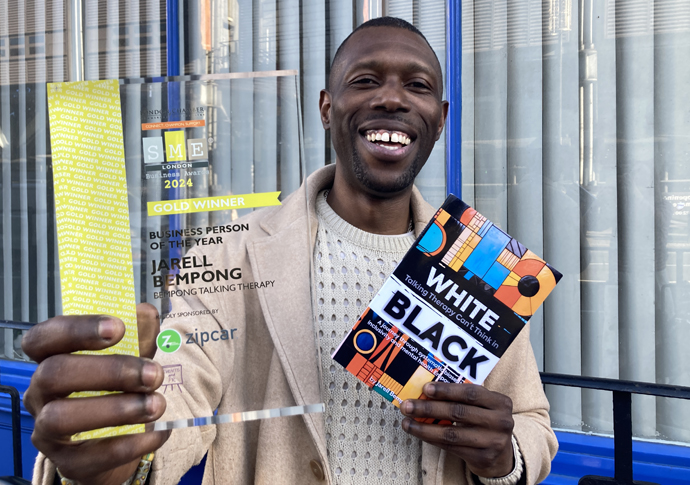‘Root cause of racism in the therapy industry is training’
Therapist who says he was stereotyped: ‘All the fathers of psychology I learned about were white’
Friday, 16th February 2024 — By Charlotte Chambers

Aiming to change the face of therapy, Jarrell Bempong with his Business Person of the Year award
IT was when Jarrell Bempong was told he was being too aggressive by his therapist that he realised there was a problem.
The 40-year-old award-winning businessman, therapist and best-selling author said he had become “animated”, but felt he was simply describing his passions.
“I noticed her shrinking into the seat and I thought she was just getting comfy because I was going into a monologue,” said Mr Bempong, who lives in Caledonian Road. “And then she said ‘Jarrell, I sense aggression’.
“That’s when I first experienced racism in the therapy room.
“Because of her lack of experience of diversity, without any interaction with a black, gay neurodivergent, expressive man before, she stereotyped me.”
It was in that moment his business, Bempong Talking Therapy, was born – the business that just helped win him the London Chamber of Commerce Business Person of the Year award last Thursday.
Mr Bempong believes addressing racism in the therapy industry is long-overdue – and he said the root cause was training.
“All the fathers of psychology I learned about were white,” he said. “When you research into them, a lot of them have racist views.
“At the time that we were building these psychological models, black people and Africans were seen as not even human so our psyche and our culture and our traditions were not taken into account in the development of these models that we still use today.”
Another issue is the fact black people are over-represented in mental hospitals but under-represented in therapy. There are few black people receiving therapy, and even fewer training as therapists.
Until black people’s experience of therapy improves, those numbers are unlikely to swing, he argues.
In response to this dawning realisation, six months ago he published a book, White Talking Therapy Can’t Think in Black. It is now an Amazon bestseller.
His experience has also pushed him to offer workplace training sessions in what he calls “cultural consciousness,” which is about understanding how one’s own identity plays into it unconscious bias.
Race, gender, political views and sexuality are all part of one’s “cultural make-up”.
“You need to be aware of it,” he states.
“I’m a black, gay dyslexic man, working- class, English Ghanaian. Now, each of these cultural identities will be either privileged or marginalised in some sense.
“So as a man, I have privilege over a woman, but white people dominate black people. It’s just how society works.
“So in therapy, or in communication, in a workplace or anything else, without taking this into account, then you’re not looking at people through an intersectional lens.”
However far his dreams stretch, he also knows that he “started out for the freaks and the marginalised” and is determined to change the face of therapy.
“I’m your champion,” he added.